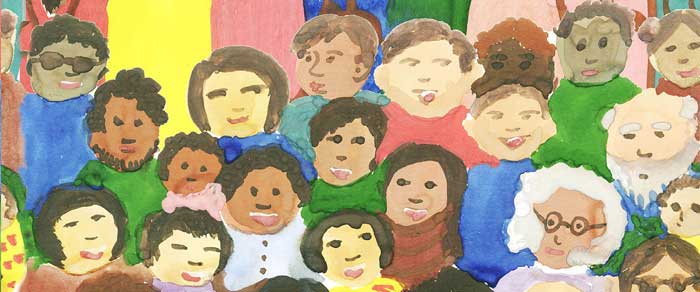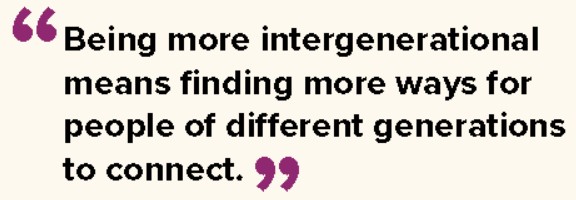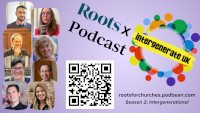In the 4th in the series, Dr Sam Richards explores how to model intergenerational principles and take baby steps towards intergenerational church, gaining buy-in from leaders and members, young and old.

PeopleImages.com – Yuri A/Shutterstock.com Click on the image to view a PDF.
Where do I start?
So, you’ve been convinced by the arguments for intergenerational ministry (see All-age support online for previous articles in the series) and are ready to take your first steps towards making it happen in your church context. Where should you start? I’ve found that the best way to start being more intergenerational is to start being more intergenerational!
You may be scratching your head at this point. But what I’m suggesting is, as a certain sports brand suggests – just do it! Now, you may be thinking that that is easier said than done, particularly in your church context. But let’s think about what first steps might be possible.
Understand your generations
First, ask what generations are actually part of your church.
We often group people in terms of inter-family generation i.e. child, parent, grandparent, great-grandparent (appreciating that not every child will take on those other roles). But it can be more helpful to think in terms of ages and stage of life e.g. babies, aged 0-2; toddlers and pre-schoolers, 2-5; children, 5-11; young people 11-17; young adults, 18-30; adults (middle aged!), 30-60; older adults, 60-75/80; and elderly, 75 plus. These are overlapping categories because everyone is different, so please use these as very rough guides and consider other factors such as neurodiversity, disability and additional needs.
Very few churches will have all of these generations represented, but most have at least two, if not more. Each generation has differing life experiences, needs, priorities, concerns, demands on their time and energy and, importantly, gifts. Each generation connects with and pictures God differently, and thus has its own take on who God is and how God is active in our lives and the world. Finding ways for the generations to share this with one another enriches us all, deepens the church’s fellowship and enables the church to share more of God with others.

Nina Rye/Shutterstock.com
Cross-generational connections
Second, having identified which generations are present in your church or group, being more intergenerational means finding more ways for people of different generations to connect. This does not mean that there is no place for separate provision for different generations – a seniors’ lunch and a toddler group are both important ways of meeting the particular needs of those groups. The challenge is to consider how these groups of people from different generations might be a blessing to each other, for example, through finding ways to foster relationships between some of the seniors and some of the toddlers and their parents and carers.
What opportunities already exist for cross-generational meeting and connection? How could you encourage more mutual caring, serving and learning at these times? For example, if you have special events (such as a summer fair or harvest festival), could you ask people from different generations to be involved in the planning, and give them the challenge of including something that brings generations together and builds relationships? For example, you could hold an intergenerational quiz where teams have to include members of at least three generations and the questions require a wide range of knowledge. Or a ‘spruce up the church and grounds’ day where the physical abilities of younger members and the know-how of older members are both needed. Or a bring-and-share meal where people move around at points and take turns to serve as they are able.

Introduce intergenerational serving together
Giving people direct experience of the joys of intergenerational ministry is a short cut to helping change the culture of your church. When planning worship services, think of every element that different people contribute such as advertising the service, preparing and decorating the worship space, choosing music, welcoming people, leading the singing, reading the Bible passages, leading the prayers, sharing the notices, preaching/teaching, running the tech, collecting the offering, hospitality after the service, clearing and cleaning up. Often there are rotas for these tasks or they may be done by the same person every time. This is efficient – but efficiency can be the enemy of intergenerational relationships!
An alternative way to approach these tasks is to see them as opportunities for everyone to contribute and to receive from one another. Why not pair up people of different generations and ask them to prepare together? For example, with Bible readings, ask the pair to meet and decide how they want to present them. This certainly takes more time than one person preparing on their own, but it may also open up a conversation between people of different generations, with each person bringing their distinctive perspective and ideas – co-discipleship in action!

Other ways of serving together
- If it is your practice to pray with the preacher or worship leader before the service, why not invite a younger and older member of the congregation to do this with you? There is nothing like being prayed for by a child and a retiree to powerfully remind the speaker that they are ministering to a range of generations in the service.
- Think about the make-up of your welcoming team. There is something very powerful about being welcomed to church by a young person or older wheelchair user – it demonstrates that all are welcome.
- Ask people of different generations to introduce a favourite song or hymn for all to learn.
- Introduce a ‘this time tomorrow’ slot (in the service, the coffee time, small groups, etc.), where each week a different person across the generations is asked what they will be doing this time tomorrow, and then prayed for.
- At the end of a service, ask a few people from different generations to share where they encountered God today; or prepare people to share where they have seen God at work in the previous week. The wide range of answers will bring the different perspectives into focus. In short, find as many ways as you can to help the generations receive from each other and enrich each other’s worship and faith.
We are called to be co-disciples with all ages – taking small steps together on the intergenerational journey helps us build relationships and allows God to build community and family within the church. Starting in these small ways will help shift the culture and create momentum that makes further change more possible – even in church!
Taking it further
- Interested in connecting with others finding their way on the intergenerational journey? Why not visit the Intergenerate UK website and sign up to hear about training webinars and networking events.
- Inspired to suggest your church leadership team takes some intergenerational steps with the church? Why not access Regenerational, a free online resource designed to help introduce intergenerational principles and practices through four all-age services.
- If you feel ready to go further on your intergenerational journey, the excellent Intergenerational Steps from New Zealand is a great tool.
Want to learn more?
|
|
 |
|
|
 |
|
|
|
- Watch the podcast series on intergenerational ministry, in collaboration with Intergenerate UK
|
 |
Dr Sam Richards is Head of Children’s and Youth Work for the United Reformed Church, where she champions children’s and youth participation in church life and mission, intergenerational practice and new ways of being church.